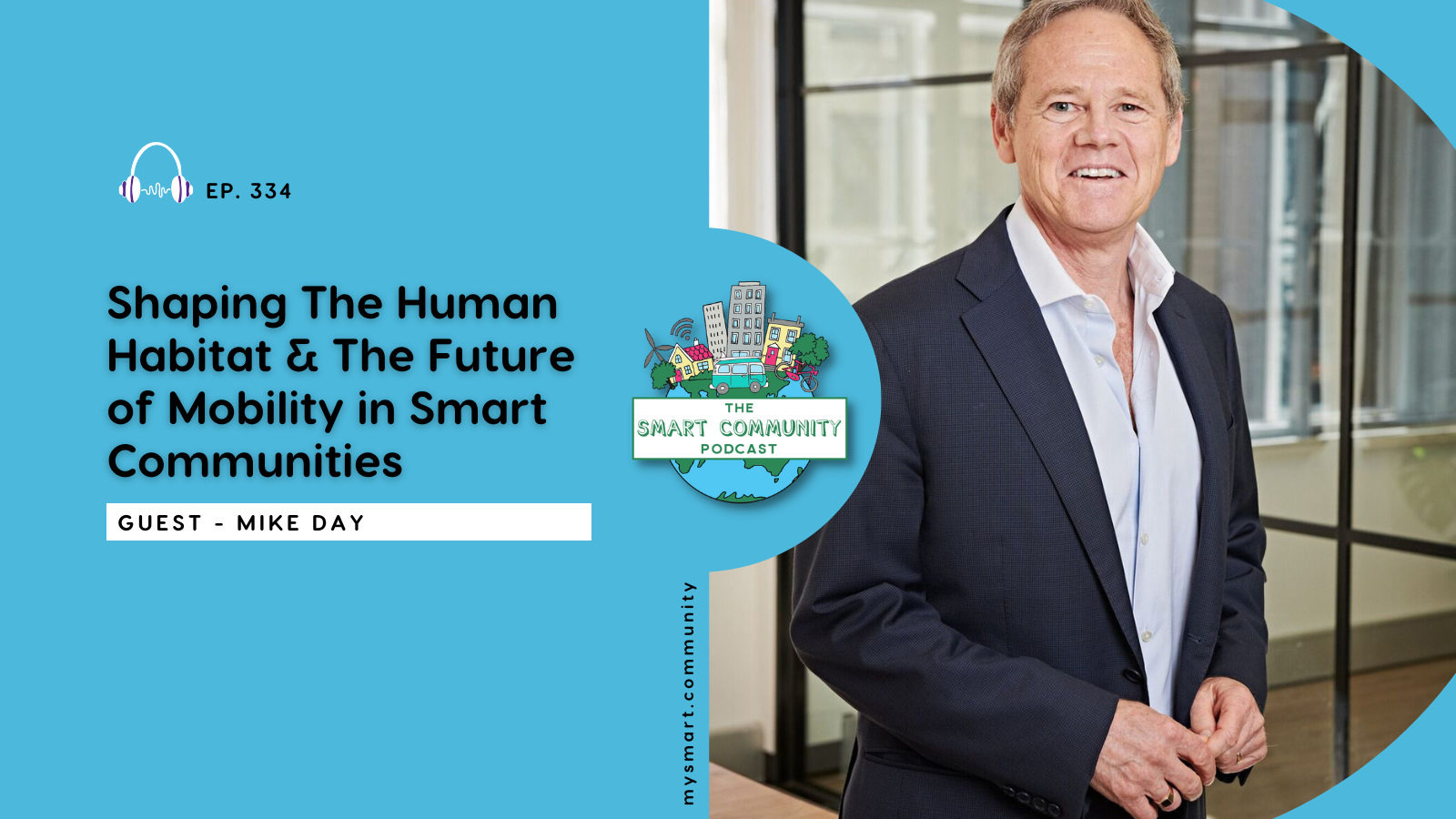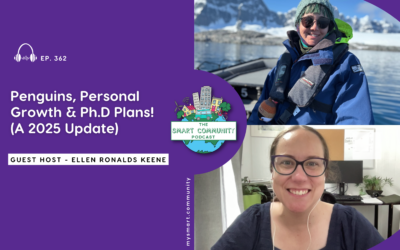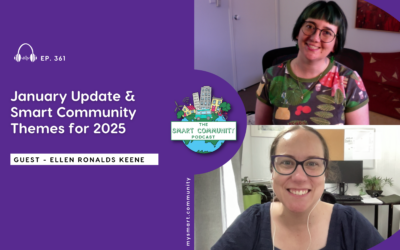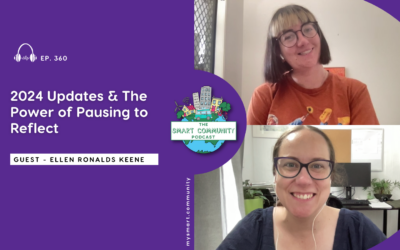Hi #SmartCommunity Friends and welcome to Mobility March! This month I have 2 great episodes for you all about the theme of mobility. In this episode of the Smart Community Podcast, I have a great chat with Mike Day from integrated planning, design and placemaking practice Hatch RobertsDay. Mike tells us about his background in town planning and why he is so passionate about shaping neighbourhoods and making better places for humans and nature.
We have a great discussion about his aversion to the term Smart and the importance of long-term thinking in building sustainable, connected and liveable cities. Mike shares a great example of this regarding putting a train line in a new suburb, and how some governments don’t do it because they are caught up in short term thinking.
Mike and I explore how we can make more accessible neighbourhoods that privilege the transport modes of walking and cycling over cars, and why it’s town planning and design to blame for our current car dependence. We talk about the decline of kids walking to school and the importance of planning places and cities for children. Mike then tells us a bit about the history of Copenhagen’s intentional creation of a culture of active transport and what we can learn from precedents like that.
We finish our chat discussing the emerging trend of the distributed or hybrid workplace, the future of mobility in our neighbourhoods, plus the new dual mandate for Transport Departments of both movement AND place. As always we hope you enjoy listening to this episode as much as we enjoyed making it.
Listen here:
What we cover in this episode:
- Mike’s background in town planning
- Why he is so passionate about shaping neighbourhoods and making better places for humans and nature
- Different ways you can impact people’s lives as a planner or as an architect
- Mike’s aversion to the term ‘Smart Community’ and why he prefers ‘timeless urbanism’
- The importance of long term thinking in building sustainable, connected and liveable cities
- The problem with governments getting stuck in short term thinking
- Learning from history about shaping the human habitat
- How we can make more accessible neighbourhoods that privilege walking and cycling over cars
- Our current car dependence and moving towards walkable urbanism
- The decline of kids walking to school and the need to plan cities for children
- Learning from presidents like Copenhagen’s intentional creation of a culture of active transport
- The misnomer of the CBD and why we should be creating multi-use places
- The emerging trend of the distributed or hybrid workplace
- The future of mobility in our neighbourhoods and communities
- The new dual mandate for Transport Departments of both movement AND place
Quotes:
“A lot of architects or engineers, it’s about advancing the engineering profession, whereas as a planner, I think we’re primarily dedicated to making better places for humans and to safeguard nature. And if we continue to just remind ourselves a bit, we realise just how privileged we are to lay the foundation for these communities.”
“To me, it’s a bit of a misnomer. What is Smart? I prefer to refer to the work that we do [as] timeless urbanism. So it’s really important for us to reflect on what’s happened in the past, but be very conscious of the future.”
“We often get referred to by our clients as futurists. That’s a really important dimension of what a planner should be doing, you should be thinking about the future, not in 3-5 years but 30 to 50 years. We’ve got this project in Perth, Ellenbrook. We started in 1993 and the train’s coming [in 2023]. I’ve had to wait 30 years for the rail to come to service that new community we’ve probably got another 5 or 10 years to go on that project. So 30-40 year projects, they’re a long time in gestation and incubation, and it’s important we think about the future.”
“This notion of micro mobility and mobility on demand, we’re seeing it now. We’re seeing the electric bikes, the electric scooters, the electric skateboards, as an alternative, and really quite a sustainable alternative to everyone getting in a car. It’s more affordable, it’s more sustainable, better for the planet. And these electric bikes, you still get as much exercise to go twice the distance as you would on a normal bike. The only thing is we need dedicated paths for the bikes to be on as well as the pedestrian.”
“It’s a legacy of the Industrial Revolution, where we separated the houses from the satanic Mills. But what’s happened is the planning profession has repeated that generation after generation after generation to the point now where everything gets separated. You’ve got to drive to the business park, you drive to the shopping centre, you’re driving kids to school.”
“The most important thing is unlike buses, [trams] actually enhance the streetscape. So particularly in Melbourne, we’ve got the largest street tram network in the world, but if you’re sitting on a street in an inner neighborhood in Melbourne, the tram goes by and enhances the streetscape. Whereas the buses, they’re very large, they’re imposing, they’re not human scale, they’re often noisy, they’re an imposition in the streetscape. So that’s where personally, I’m a big fan of these trams, and possibly these trackless trams into the future.”
“In the past, often we’ve created these traffic sewers, [where] we’ve just tried to move the cars as quickly as possible. But, as a pedestrian or cyclist, they’re really hostile places to be.”
Links:
MIT Media Lab City Science https://www.media.mit.edu/groups/city-science/projects/
CLRA Consolidated Land Around Australia https://www.clara.com.au
Chris Leinberger article on walkable urbanism https://www.brookings.edu/on-the-record/walkable-urbanism/
Chris Leinberger paper on the future of workplace https://www.cushmanwakefield.com/en/insights/covid-19/the-future-of-workplace
SCP E287 Smart Communities for Children with Natalia Krysiak https://mysmart.community/2022/04/11/scp-e287/
Bykko Electric bike share in Newcastle, NSW https://bykko.com.au
20 minute neighbourhoods project in Melbourne https://www.planmelbourne.vic.gov.au/current-projects/20-minute-neighbourhoods
Connect:
Connect with Mike on LinkedIn and Twitter @walkplace
Connect with me via email: hello@mysmart.community
Connect with My Smart Community via LinkedIn or Twitter and watch on YouTube
Podcast Production by Perk Digital






0 Comments